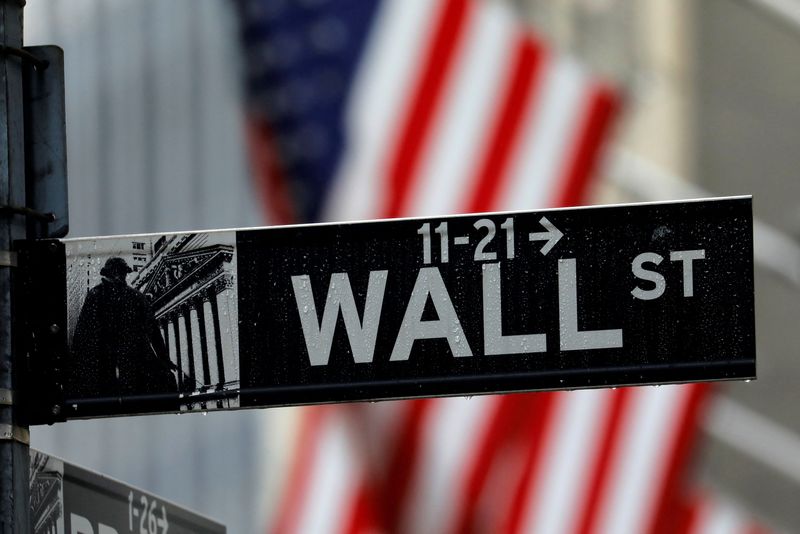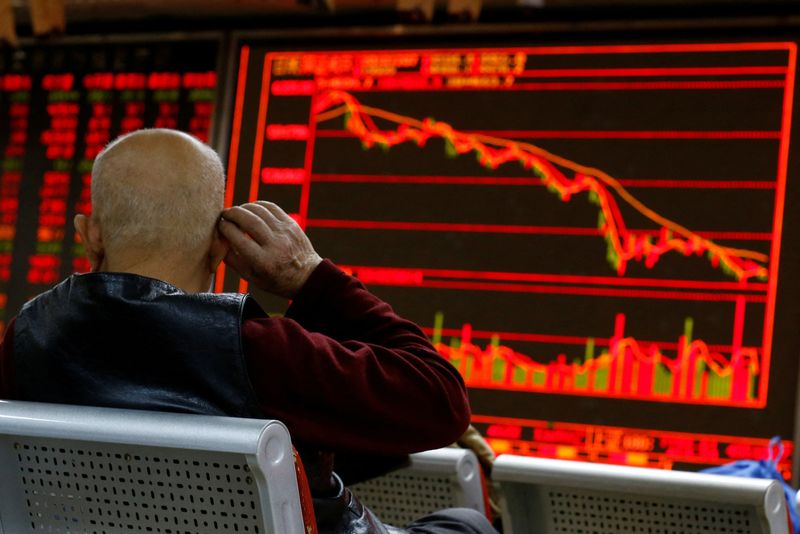By Stephen Culp
NEW YORK (Reuters) - Wall Street lost ground on Monday and crude prices advanced as investors digested the aborted Russian mutiny over the weekend and wrestled with lingering concerns over the path of Federal Reserve monetary policy.
All three major U.S. stock indexes ended red, with megacap momentum stocks pulling the tech-heavy Nasdaq to the sharpest decline, down 1.16%.
The blue-chip Dow closed only slightly lower, its losses held in check by consumer discretionary and industrials.
Economically sensitive real estate, transports, materials and smallcaps all outperformed the broader market.
"We're having a bit of a correction, with (Fed Chair Jerome) Powell still talking about keeping rates higher for longer," said Paul Nolte, senior wealth adviser and market strategist at Murphy & Silvest in Elmhurst, Illinois.
"A lot of those big tech companies have had quite a run, so we’re seeing a rotation into smallcaps and value, which are doing well because they are all very inexpensive today."
Geopolitical turmoil dampened risk appetites in the wake of an aborted mutiny in Russia, which appeared to reveal cracks in Russian President Vladimir Putin's grip on power.
"I don't think investors in equities or fixed income are that concerned about (Russia), unless it balloons into something more," Nolte said, adding that the mutiny attempt's "lifespan has ended and there's nothing else to see and do here."
Market participants now expect the central bank to raise the Fed funds target rate by another 25 basis points in July, but the path beyond is less clear and dependent on economic data.
Financial markets are pricing in a 76.9% probability of the July rate hike, according to CME's FedWatch tool.
U.S. data on tap this week includes new orders for durable goods, housing data, the Commerce Department's final take on first-quarter GDP, consumer surveys from The Conference Board and University of Michigan and Friday's Personal Consumption Expenditures (PCE) report, which covers consumer income/outlays, and crucially, inflation.
"If we see very strong consumer spending and still-high inflation, then the Fed stays in the game that much longer," Nolte added.
The Dow Jones Industrial Average fell 12.72 points, or 0.04%, to 33,714.71, the S&P 500 lost 19.51 points, or 0.45%, to 4,328.82 and the Nasdaq Composite dropped 156.74 points, or 1.16%, to 13,335.78.
European stocks closed modestly lower, pulled down by healthcare stocks, while defense shares dropped following the rapid sequence of events in Russia.
The pan-European STOXX 600 index lost 0.10% and MSCI's gauge of stocks across the globe shed 0.26%.
Emerging market stocks lost 0.26%. MSCI's broadest index of Asia-Pacific shares outside Japan closed 0.35% lower, while Japan's Nikkei lost 0.25%.
U.S. Treasury yields mostly edged lower as investors grappled the Fed's "higher for longer" message even as the economy begins to slow.
Benchmark 10-year notes last rose 7/32 in price to yield 3.7134%, from 3.739% late on Friday.
The 30-year bond last rose 4/32 in price to yield 3.8142%, from 3.82% late on Friday.
The dollar gained against the Russian rouble but backed down from a 15-year high, while the yen posted modest gains. The greenback edged lower against a basket of world currencies.
The dollar index fell 0.14%, with the euro up 0.16% to $1.0906.
The Japanese yen strengthened 0.16% versus the greenback at 143.50 per dollar, while Sterling was last trading at $1.2712, up 0.01% on the day.
Oil prices moved higher as political turmoil in Russia stoked concerns over supply disruption.
U.S. crude rose 0.30% to settle at 69.37 per barrel, while Brent settled at $74.18 per barrel, up 0.45% on the day.

Gold firmed, inching off from the previous session's three-month low as geopolitical reverberations from Russia outweighed Fed hawkishness.
Spot gold added 0.1% to $1,922.39 an ounce.
